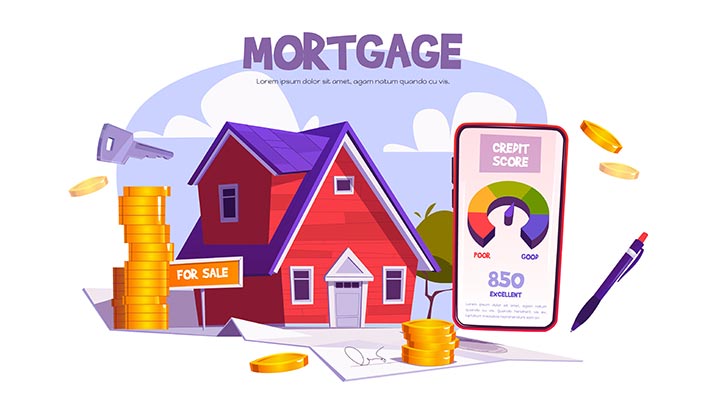A mortgage is a loan that is used to purchase a property, typically a home. The property serves as collateral for the loan, and the borrower makes monthly payments to the lender until the loan is fully repaid. Mortgages are a common way for people to buy a home, as they allow individuals to purchase a property even if they do not have the full amount of cash on hand.

Table of Contents
I. Introduction
- Definition of Mortgages
- Types of Mortgages
- Credit Score
- Income and Employment History
- Debt-to-Income Ratio
- Different Types of Mortgage Programs
- Down Payment
- Making Payments
- Consequences of Missed Payments
- Help with Payment Difficulties
- Advantages
- Disadvantages
- Summary
- Recommendations
When applying for a mortgage, there are several factors to consider. The first is the type of mortgage you are applying for. There are two main types of mortgages: fixed-rate and adjustable-rate.
A fixed-rate mortgage has an interest rate that remains the same for the entire term of the loan, usually 15 or 30 years. This means that the monthly payment will stay the same for the life of the loan, making budgeting for your mortgage payments easier.

An adjustable-rate mortgage (ARM) has an interest rate that changes over time. The interest rate is typically lower than a fixed-rate mortgage at the beginning of the loan, but it can increase over time. This means that the monthly payment can change, which can make budgeting for your mortgage payments more difficult.
Another important factor to consider when applying for a mortgage is your credit score. Your credit score is a measure of your creditworthiness and it's used by lenders to determine the interest rate you qualify for. The higher your credit score, the better interest rate you will qualify for. This can result in a lower monthly payment and a lower total cost of the loan.
In addition to your credit score, lenders will also consider your income, employment history, and debt-to-income ratio when determining whether to approve your mortgage application. Your debt-to-income ratio is a measure of how much of your income is going towards debt payments. Lenders typically look for a ratio of 43% or lower when evaluating a mortgage application.

There are also different types of mortgage programs available, such as conventional, FHA, VA, and USDA loans. Conventional loans are not insured or guaranteed by the government and typically have stricter qualifying criteria. FHA, VA, and USDA loans are government-insured and may have more relaxed qualifying criteria and lower down payment requirements.
Another important aspect of mortgages is the down payment. A down payment is the amount of money you pay upfront towards the purchase of a property. The larger the down payment, the lower the amount of the loan and the less interest you will pay over the life of the loan.
Once you have a mortgage, it's important to stay on top of your payments. Missing a payment can have serious consequences, such as damaging your credit score or even leading to foreclosure. If you're having trouble making your mortgage payments, reach out to your lender as soon as possible.
Advantages of Mortgages:
- Allows individuals to purchase a home without paying the full amount upfront.
- Can provide a sense of stability and security with a fixed-rate mortgage.
- Can help build equity in a property over time.
- Can provide tax benefits as mortgage interest payments may be tax-deductible.
- Government-insured loans may have more relaxed qualifying criteria and lower down payment requirements.
Disadvantages of Mortgages:
- Requires a long-term commitment, usually 15 to 30 years.
- Monthly payments can be high, especially if interest rates are high.
- Adjustable-rate mortgages can result in higher monthly payments over time.
- Missed payments can have negative consequences, such as damaging credit score or leading to foreclosure.
- May require a large down payment, which can be difficult for some individuals to come up with.
- Closing costs can be high and add to the overall expense of buying a home.
- Interest rates and payments can change over time, making budgeting difficult.
- Mortgages can have prepayment penalties, which can make it expensive to pay off the mortgage early.
In conclusion, a mortgage is a loan used to purchase a property, usually a home. It's important to consider the type of mortgage, your credit score, income, and other factors when applying for a mortgage. It's also important to stay on top of your payments to avoid negative consequences. It's important to research and compare different options before choosing the best mortgage for you. It's also recommended to consult with a mortgage expert or financial advisor to help you with the process.
Back to top of page Reviewed by Kerala Home Design
on
January 28, 2023
Rating:
Reviewed by Kerala Home Design
on
January 28, 2023
Rating:




















No comments: